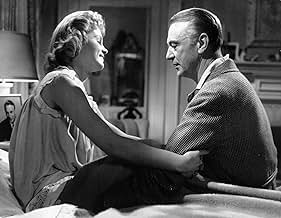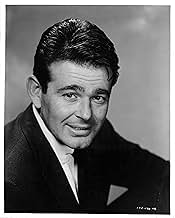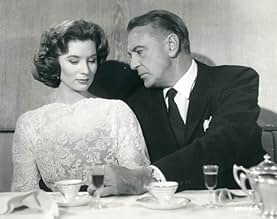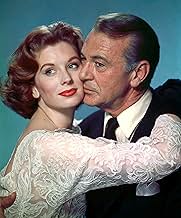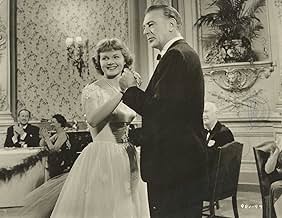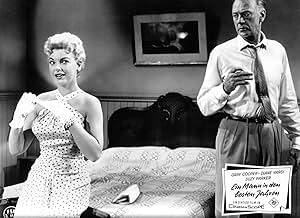अपनी भाषा में प्लॉट जोड़ेंFollowing her father's funeral, Ann reflects on his final years marked by political decline, an unhappy marriage, and drinking only to discover he had experienced one secret period of joy an... सभी पढ़ेंFollowing her father's funeral, Ann reflects on his final years marked by political decline, an unhappy marriage, and drinking only to discover he had experienced one secret period of joy and romance.Following her father's funeral, Ann reflects on his final years marked by political decline, an unhappy marriage, and drinking only to discover he had experienced one secret period of joy and romance.
- पुरस्कार
- 1 जीत और कुल 1 नामांकन
Robert Adler
- Farmer
- (बिना क्रेडिट के)
- …
John Alban
- Dinner Guest
- (बिना क्रेडिट के)
Brandon Beach
- Dinner Guest
- (बिना क्रेडिट के)
Melinda Byron
- Hope
- (बिना क्रेडिट के)
Mary Carroll
- Nurse
- (बिना क्रेडिट के)
Beulah Christian
- Nightclub Patron
- (बिना क्रेडिट के)
Buck Class
- Bill
- (बिना क्रेडिट के)
फ़ीचर्ड समीक्षाएं
John O'Hara's book TEN NORTH FREDERICK was hardly the masterpiece of political life, but it had strong characterizations, and the film, also not a masterwork, has a lot more going for it than we initially thought. Still of major consequence are the performances of the supporting players. In this tale of a failed political hopeful, his vengeful wife, his youngish girlfriend, and assorted other characters, the viewer is caught by the superb work of the cast. All seems possible with the effective work. Geraldine Fitzgerald, as always, is a total marvel -- one of the finest of three decades. She should be almost deified. In this, she eschews her sensitive side to superbly capture the nastiness of a woman who want more and more... with less change to get it. But she is matched by young Ray Stricklyn as the confused young son... with at least one scene that should have done for him what the telephone scene in The Great Ziefgeld did for Luise Rainer. His work indicates the hope we all had for him.... but he correctly went to the L.A. stage where he scored enormous successes. Diane Varsi and Stuart Whitman both underscore the acting skills we first saw in them. The love story between the older Gary Cooper and the younger Suzy Parker works better than I had recalled. He tries with his expected skill to show the desperation of the man, but Suzy Parker DOES offer a multi-layered performance -- far superior to the work she had done in other films. This film remains an interesting Hollywood look at the world of politics, and it should not be buried unmarked in the annals of solid craftmanship.
Gary Cooper plays Joe Chapin, a very successful man turning fifty years old, prodded into state politics by his nagging wife, played by Geraldine Fitzgerald. Chapin shuns the political scene when he finds it going against the standards and principles he lives by. His wife soon makes him feel a loser and he finds solace in the arms of his daughter's roommate, half his age.
Romantic and consuming; from the pen of Philip Dunne. This is an over looked drama shot in black and white. Daughter Ann is played by Diane Varsi and her roommate Kate is played by the lovely Suzy Parker. Also in the cast are Stuart Whitman and Ray Sticklyn.
Romantic and consuming; from the pen of Philip Dunne. This is an over looked drama shot in black and white. Daughter Ann is played by Diane Varsi and her roommate Kate is played by the lovely Suzy Parker. Also in the cast are Stuart Whitman and Ray Sticklyn.
Gary Cooper made six films after "Ten North Frederick" -- and by the last one, "The Naked Edge," he was near death and filming had to be stopped frequently to give him oxygen.
Here, in a film based on a novel by John O'Hara, he plays Joseph Chapin, a lawyer with a son, Joby (Ray Stricklyn), a daughter,Ann (Diane Varsi) and an absolute shrew as a wife, Edith (Geraldine Fitzgerald). He's a gentle man, who has probably kept peace in his life by giving in to his wife.
The film begins with Joe's funeral, with his daughter Ann looking back on the last five years. Her own life has been affected by falling in love with a talented trumpet player (Stuart Whitman) and her ensuing unhappiness, and her brother wanted to study music at Juilliard but is pressured to attend law school. The war intervenes, and at the beginning of the film, he has returned for the funeral.
Edith has political ambitions and pushes Joe into throwing his hat in the ring; he soon finds it's too dirty a game for him and withdraws.
Joe, disillusioned, his beloved daughter having left home, he goes to New York to visit her and meets her gorgeous roommate (Suzy Parker). The two fall in love, despite their age difference.
I have to say, I felt the film was a little on the dull side - the pace was slow, and the acting, despite some of the comments here, I found rather dull. The thing about Gary Cooper is that he underplays and is very subtle - now, there's underplaying and there's just not acting. I have to say I didn't feel Diane Varsi did much acting here. Geraldine Fitzgerald was terrific, as was Ray Stricklyn, who went on to Broadway success and a huge career in publicity with the John Springer organization, handling people like Elizabeth Taylor and Bette Davis. Suzy Parker was always a total vision, but never much of an actress.
The most effective scenes were at the end of the movie, very beautiful and well worth waiting for. Cooper really shone throughout, but especially in the last section. A wonderful presence, and, like many stars of that era, we lost him too soon. It's sad to realize that they're all gone, including Varsi, who died at age 54.
Worth seeing for some of the performances. A little sharper direction would have brought it up a level.
Here, in a film based on a novel by John O'Hara, he plays Joseph Chapin, a lawyer with a son, Joby (Ray Stricklyn), a daughter,Ann (Diane Varsi) and an absolute shrew as a wife, Edith (Geraldine Fitzgerald). He's a gentle man, who has probably kept peace in his life by giving in to his wife.
The film begins with Joe's funeral, with his daughter Ann looking back on the last five years. Her own life has been affected by falling in love with a talented trumpet player (Stuart Whitman) and her ensuing unhappiness, and her brother wanted to study music at Juilliard but is pressured to attend law school. The war intervenes, and at the beginning of the film, he has returned for the funeral.
Edith has political ambitions and pushes Joe into throwing his hat in the ring; he soon finds it's too dirty a game for him and withdraws.
Joe, disillusioned, his beloved daughter having left home, he goes to New York to visit her and meets her gorgeous roommate (Suzy Parker). The two fall in love, despite their age difference.
I have to say, I felt the film was a little on the dull side - the pace was slow, and the acting, despite some of the comments here, I found rather dull. The thing about Gary Cooper is that he underplays and is very subtle - now, there's underplaying and there's just not acting. I have to say I didn't feel Diane Varsi did much acting here. Geraldine Fitzgerald was terrific, as was Ray Stricklyn, who went on to Broadway success and a huge career in publicity with the John Springer organization, handling people like Elizabeth Taylor and Bette Davis. Suzy Parker was always a total vision, but never much of an actress.
The most effective scenes were at the end of the movie, very beautiful and well worth waiting for. Cooper really shone throughout, but especially in the last section. A wonderful presence, and, like many stars of that era, we lost him too soon. It's sad to realize that they're all gone, including Varsi, who died at age 54.
Worth seeing for some of the performances. A little sharper direction would have brought it up a level.
John O'Hara's novel transferred to the screen,half valid drama,half soap opera ; it was the fifties ,and with directors such as Sirk and Minnelli,the apex of melodrama. Philip Dunne is not in their league but his cast carries the movie on their shoulders and makes it a winner .
An aging Gary Cooper , towards the end of the career, is deeply moving as a man whose ambitions are relatively modest (he only wants to be a lieutenant governor) but whose life will be ruined by a selfish wife ; his scene with Suzy Parker,when he speaks of the children they'll never have (because of his age) ,goes straight to the heart ; note that in his scene with Stuart Whitman (then an up-and-coming actor who considered Cooper a model ),he only intervenes towards the end ,as though he reluctantly approves of his collaborators' advice (and blackmail)
Matching him every step of the way is Geraldine Fitzgerald' s cold self-centered socialite who does not care about her children 's happiness. A woman who never loved anyone but herself.
Diane Varsi is convincing as the sacrificed daughter ,but her affair with Buongiorno is a little botched ; Ray Stricklyn who,unlike Whitman , never became a big star, shines in his last scene when he takes a rebel stand against these hypocrit "friends " ( the first scenes ,notably with the journalists ,were revealing )
An aging Gary Cooper , towards the end of the career, is deeply moving as a man whose ambitions are relatively modest (he only wants to be a lieutenant governor) but whose life will be ruined by a selfish wife ; his scene with Suzy Parker,when he speaks of the children they'll never have (because of his age) ,goes straight to the heart ; note that in his scene with Stuart Whitman (then an up-and-coming actor who considered Cooper a model ),he only intervenes towards the end ,as though he reluctantly approves of his collaborators' advice (and blackmail)
Matching him every step of the way is Geraldine Fitzgerald' s cold self-centered socialite who does not care about her children 's happiness. A woman who never loved anyone but herself.
Diane Varsi is convincing as the sacrificed daughter ,but her affair with Buongiorno is a little botched ; Ray Stricklyn who,unlike Whitman , never became a big star, shines in his last scene when he takes a rebel stand against these hypocrit "friends " ( the first scenes ,notably with the journalists ,were revealing )
Although Gary Cooper is my favorite actor, this was a movie I had never seen until a few years ago, when I happened to catch it after waking in the wee hours of the morning and turning on the television after not being able to get back to sleep. It seems like this movie isn't very well-respected, but I think it is fantastic and have recommended it to several people. Admittedly, it's not High Noon, but it's quite bittersweet (heartbreaking, even) and has a touch of romance. Gary Cooper's character is a very decent man at heart and truly tries to do the right thing when it comes to the major decisions he has to make, but it seems he can't win being married to such a shrewish woman.
क्या आपको पता है
- ट्रिवियाSpencer Tracy was originally cast in the lead role, but withdrew due to ill health and concerns over the ability of co-star Suzy Parker. Tracy told reporters in November 1957 he had withdrawn from this film to star in The Last Hurrah (1958).
- गूफ़In the opening sequence, which is supposed to be taking place in 1945, a 1950 Lincoln Cosmopolitan prominently pulls up in front of the house.
- भाव
Stella: You're hurtin' my arm.
Joseph B. 'Joe' Chapin: I frequently hurt people without meaning to. It's my specialty.
- कनेक्शनFeatured in Inventing the Abbotts (1997)
- साउंडट्रैकOn the Atchison, Topeka and the Santa Fe
(uncredited)
Music by Harry Warren
Played on the phonograph in Joby's room
टॉप पसंद
रेटिंग देने के लिए साइन-इन करें और वैयक्तिकृत सुझावों के लिए वॉचलिस्ट करें
विवरण
- रिलीज़ की तारीख़
- कंट्री ऑफ़ ओरिजिन
- भाषा
- इस रूप में भी जाना जाता है
- Ein Mann in den besten Jahren
- फ़िल्माने की जगहें
- उत्पादन कंपनी
- IMDbPro पर और कंपनी क्रेडिट देखें
- चलने की अवधि
- 1 घं 42 मि(102 min)
- रंग
- ध्वनि मिश्रण
- पक्ष अनुपात
- 2.35 : 1
इस पेज में योगदान दें
किसी बदलाव का सुझाव दें या अनुपलब्ध कॉन्टेंट जोड़ें

